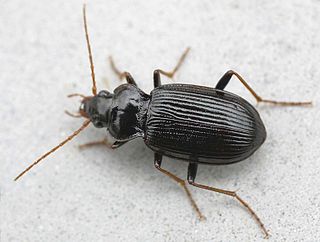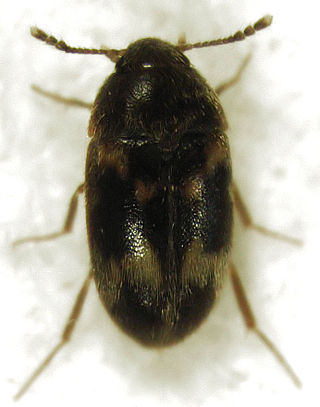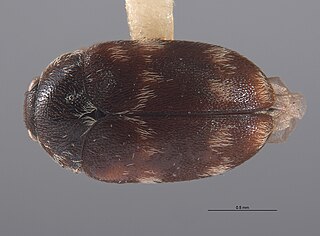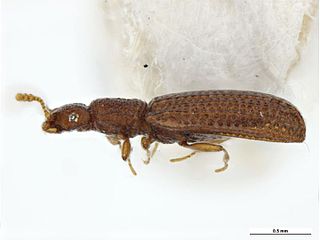
Corticaria is a genus of beetles in the family Latridiidae.

Trogoderma is a genus of beetles in the family Dermestidae, the skin beetles. There are about 135 species worldwide.

Nebria is a genus of ground beetles native to the Palearctic, the Near East and North Africa. There are more than 500 described species in Nebria.

Nebria brevicollis, belonging to the Carabidae family, is a ground beetle. With nearly 500 species and over 100 subspecies, N. brevicollis is the most diverse genus within the Nebriini tribe of ground beetles. Members of the genus occupy a wide range of habitats. Nebria brevicollis is native to Europe and the Near East but has been introduced to the western United States and Canada. Its rapid expansion in North America is characteristic of an invasive species. Due to the variation in habitat, their diet consists of small arthropods including Collembola, Diptera, earthworms, mites, and spiders.

Nosodendridae is a family of beetles, with less than a hundred species in three extant genera, which are found worldwide. Nosodendron, the largest genus, is found in forests and attracted to yeast generated slime on the wounds of trees, and likely consumes fermented substances as well as fungi and microorganisms. Several additional genera and species are known from the fossil record. Nosodendridae is considered to be an isolated lineage within Polyphaga, being the sister group to the clade containing Staphyliniformia, Bostrichoidea and Cucujiformia.

Alexiidae is a family of beetles. It contains a single genus, Sphaerosoma, formerly included within the family Cerylonidae, with around 50 species which are native to the western Palearctic. Species of Sphaerosoma are very small, around 1 to 2 mm in length rounded beetles with clubbed antennae. They are fungivores, having been observed feeding on mushrooms, and have also been found in leaf litter and on decaying bark.

The Mycetophagidae or hairy fungus beetles are a family of beetles in the superfamily Tenebrionoidea. The different species are between 1.0 and 6.5 mm in length. The larvae and adults live in decaying leaf litter, fungi, and under bark. Most species feed on fungi. Worldwide, the 18 genera contain around 200 species.

Cryptorhopalum is a genus of beetles in the family Dermestidae which is known only from North to South America.

Dienerella is a genus of beetles in the family Latridiidae, containing the following species:
Europs is a genus of beetles in the family Monotomidae, containing the following species:
Nebria germarii is a species of ground beetle in the Nebriinae subfamily that can be found in Austria, Germany, Italy, Liechtenstein, Switzerland, and in every state of former Yugoslavia, except for North Macedonia.
Nebria reitteri is a species of ground beetle in the Nebriinae subfamily. It is found in Romania and Ukraine.
Nebria ambigua is a species of black coloured ground beetle in the Nebriinae subfamily that is endemic to Tajikistan.
Nebria araschinica is a species of ground beetle in the Nebriinae subfamily that can be found in Armenia and Turkey.
Nebria viridipennis is a species of black coloured ground beetle from Nebriinae subfamily that can be found in Georgia and Russia. The species are 13 millimetres (0.51 in) long.
Nebria tristicula is a species of black coloured ground beetle in the Nebriinae subfamily that can be found in Georgia and Russia, in Yatyrgvart mountains. The species are 13 millimetres (0.51 in) long.

Nebria metallica is a species of ground beetle in the subfamily Nebriinae first described by Gotthelf Fischer von Waldheim in 1822. It ranges from the Aleutian Islands, southern Alaska, and western Canada south to Washington and Montana.
Nebria grumi is a species of ground beetle in the Nebriinae subfamily that is endemic to Kyrgyzstan.

Limnichidae, commonly called minute marsh-loving beetles, is a family of beetles belonging to Byrrhoidea. There are at least 30 genera and 350 described species in Limnichidae. They are found worldwide, with the greatest diversity in tropical regions. Most species seem to be associated with water-adjacent habitats, such as riparian and coastal locations, though many species are likely fully terrestrial, with some species being associated with leaf litter and arboreal habitats. Species with known diets feed on moss or algae. The oldest fossils of the family are known from mid-Cretaceous Burmese amber from Myanmar.










